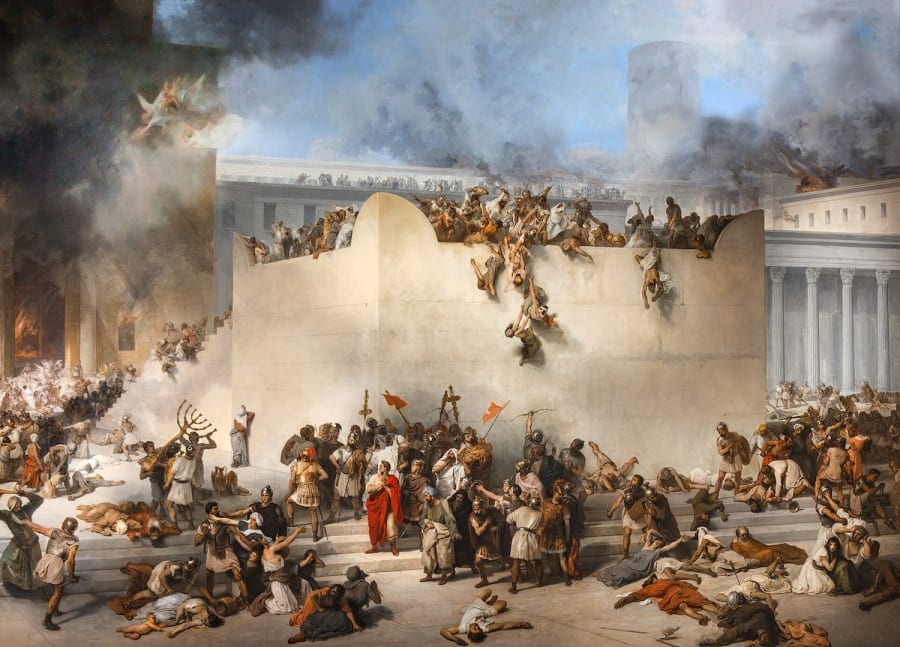What is Tisha B’Av, the Jewish fast day?
Why do Jews fast on Tisha B’Av? Is it a biblical commemoration?

While many non-Jews are familiar with the Jewish fast on Yom Kippur (Day of Atonement), fewer may be familiar with the fast of Tisha B’Av.
The name Tisha B’Av is Hebrew for the 9th of Av, one of the months on the Hebrew calendar. According to rabbinic tradition, both the First and Second Jewish Temples in Jerusalem were destroyed on this date.
Biblical texts describing the destruction of Solomon’s Temple (First Temple), place it on one of two dates. According to the Book of Jeremiah 52:12, it was destroyed on the 10th of Av, while according to 1 Kings 25:8, the temple was destroyed on the 7th of Av.
Dr. Rabbi Zev Farber, a research fellow at the Kogod Center of the Shalom Hartman Institute in Jerusalem, said the connection to the destruction of the two temples with the 9th of Av, along with several other calamities from Israel’s history, is probably a rabbinic invention.
The rabbis of the Mishnah – a collection of Jewish oral traditions from the 2nd century A.D. – say that five tragedies befell the Jewish people on that date: The punishment of wandering in the wilderness, the destruction of the First Temple, the destruction of the Second Temple, the destruction of Beitar (the capital city of Bar Kochba), and the conversion of Jerusalem into a pagan city by Emperor Hadrian.
Farber says that most likely, “the rabbis are beginning with one well-known event and date and are piling these other events onto that date to express the divine providence behind it and show God’s hand in history as One who punishes Israel for their sins.”
Jews later connected other Jewish tragedies to this same date, such as the order to expel the Jews from England in 1290, the conclusion of the expulsion of the Jews from Spain in 1492, approval for the Final Solution being given to Heinrich Himmler on August 2, 1941, and the beginning of the deportation of Jews to the Treblinka extermination camp on July 23, 1942.
The practice of fasting in observation of the Temple’s destruction may go back to the period of the Jewish exile. The prophet Zechariah mentions a group of fasts that will become celebrations in Israel’s future.
Zechariah 8:19 reads: "Thus said YHWH of Hosts: The fast of the fourth month, the fast of the 5th month (Av), the fast of the 7th month, and the fast of the 10th month shall become occasions for joy and gladness, happy festivals for the House of Judah; but you must love honesty and integrity.”
In Judaism, the three weeks leading up to Tisha B’Av are a period of semi-mourning called Bein HaMitzarim (between narrow straits). Religious Jews do not get married during this time, nor hold celebrations or cut their hair.
Starting with the first of Av, religious Jews also refrain from drinking wine, eating meat, shaving or buying new clothes. All of these acts of mourning culminate in the fast of Tisha B’Av, starting at sundown. From that point, religious Jews engage in a total fast – without food or water – until the next sundown.
During that time normal Torah reading and prayer recitation is suspended in favor of readings from the Book of Lamentations.
However, just as many prophets who spoke of Jerusalem’s destruction also spoke of her future restoration, especially in the Messianic age. Therefore, sabbath readings after Tisha B’Av include selections from the prophetic consolation texts.

The All Israel News Staff is a team of journalists in Israel.













